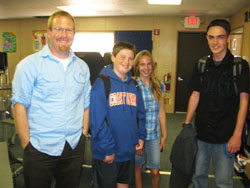The goal of gaining increased knowledge of how the brain learns and translating the scientific understanding into the classroom is a major tenet of TDLC, and just now the Social Interaction Network’s Terry Jernigan is helping develop a more complete model of brain development and its role in education. The research project comes out of partnership with San Diego’s High Tech Middle School in San Marcos and combines brain imaging with behavioral assessment and training of 40 student volunteers to track social/emotional functions – the mental processes that take the longest time for humans to develop.
Dr. Jernigan, Principal Investigator of the project, which is titled “Social/emotional functions, academic skills, and brain maturation during adolescence: Focus on adaptive interventions,” is a UC San Diego Professor of cognitive science, psychiatry and radiology, as well as Director of the Center for Human Development. Her research team represents collaboration among three TDLC networks and three institutions:
- Paula Tallal, Professor, Center for Molecular and Behavioral Neuroscience, Rutgers University, TDLC Director of Translation, Member, IMS/SMN Networks and Director, Scientific Learning Corp.
- Marian Bartlett, Associate Research Scientist, Institute for Neural Computation, UC San Diego, TDLC Director of Science Programs and Leader, SIN Network
- Gwendolen Littlewort, Assistant Project Scientist, Institute for Neural Computation, UC San Diego and Member, SIN Network
- Judy Reilly, Professor, Psychology, San Diego State University and Member, SIN Network
- Doris Alvarez, Leader, The Educator Network (TEN) and Member, TDLC Executive Committee
 On the other side of the multilayered project is Ryan Gallagher, High Tech Middle School’s enthusiastic 8th grade math and science teacher, who, in keeping with the charter school’s hands-on approach to learning science, is using it as an opportunity to introduce his students to real-life research. On the other side of the multilayered project is Ryan Gallagher, High Tech Middle School’s enthusiastic 8th grade math and science teacher, who, in keeping with the charter school’s hands-on approach to learning science, is using it as an opportunity to introduce his students to real-life research.
It seems that in the past there has been little systematic research on the role of individual emotion processing on academic skill development or, indeed, to directly relate the effects of attempted interventions. So here, these assessments are added to the study of brain maturation and adaptive educational interventions. The project also incorporates self-report inventories measuring a student’s attitude toward mathematics or their emotional associations with school math instruction, as well as a self-evaluation of their proficiency and probability of doing well in the mathematics subject matter.
The first step in the process is baseline magnetic resonance imaging (MRI) of the volunteers. After that they participate in a 10-week web-based math intervention program called ALEKS® (Assessment and Learning in Knowledge Spaces) http://www.aleks.com. This groundbreaking technology partner offers the students one-on-one instruction Monday-Friday, first determining what they know and don’t know about their math course, then instructing them on the topics they are most ready to learn and periodically reassessing them. After the ALEKS experience there are follow-up behavioral assessments and MRI scanning of the students. The final phase, just now being reached, consists of comparing pre- and post-MRI scans and analyzing how the intervention program has impacted the brain structure of the students. And future planning is to involve tracking by means of videographic data obtained during standardized time periods.
Another facet of the project is researching any similar effects with the use of the language intervention program Fast ForWord®, spearheaded by Professor Tallal.
 by Carolan Gladden by Carolan Gladden
|
 On the other side of the multilayered project is Ryan Gallagher,
On the other side of the multilayered project is Ryan Gallagher,